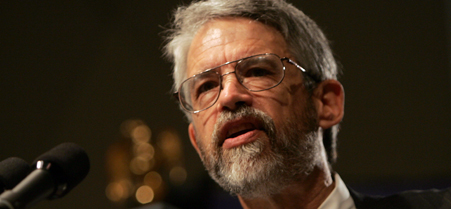OMB asks agencies to focus on science and technology in 2011
New guidance seen as a way to support the White House policy to increase funding in research and reverse the Bush administration's cuts in spending on science.
 (Aug. 5) -
John Holdren, director of the Office of Science and Technology Policy, asked agencies to focus on science and technology for their fiscal 2011 budgets.
(Aug. 5) -
John Holdren, director of the Office of Science and Technology Policy, asked agencies to focus on science and technology for their fiscal 2011 budgets.
The White House released a memo on Tuesday telling agencies to direct more spending on science and technology when formulating fiscal 2011 budgets as a way for the Obama administration to increase federal funding for basic scientific research.
According to the memo , issued by Office of Management and Budget Director Peter R. Orszag and John Holdren, director of the White House Office of Science and Technology Policy, agencies should direct resources toward science and technology programs that will drive economic growth, promote energy efficiency and improve quality of life. Most of the funds will come in the form of grants for basic research.
"This is raising the importance of science up at a very high level," said Craig Jennings, a senior policy analyst at the nonprofit OMB Watch. "By putting it into budget requests, it's a clear indication that this is how [the White House] wants to make decisions. It's a new direction and a counterpoint to what we saw in the Bush administration, with science kind of being buried."
The memo shows the Obama administration is reemphasizing science and technology after Bush significantly cut federal funding for scientific research, said Ray Bjorklund, senior vice president and chief knowledge officer at FedSources, a market research firm in McLean, Va.
But the federal IT contractors likely will not see more spending because most of the technologies under development are years away from practical application, he said. The timing of the memo also likely will reduce the impact because agencies have started discussing budget priorities for fiscal 2011 with OMB.
Most administrations include language in their budgets regarding the importance of investments in science and technology to the national economy, and the Office of Science and Technology Policy issued similar guidance in the past, although not for fiscal 2010.
What is different, however, is an attempt to establish metrics to track the outcome of research investments and the effort to increase collaboration among agencies. The second to last paragraph, Bjorklund said, directs agencies to "establish procedures and timelines for evaluating the performance of these activities, and target investments toward high-performing programs."
That language is more targeted than in the past, and the recommendation that agencies develop "science of science policy tools that can improve management of their research and development portfolios" will be particularly challenging, he said.
"This is something that major labs like the National Institute for Standards and Technology or universities often grapple with," Bjorklund said. "The National Science Foundation does this pretty well in terms of deciding when to give or cut off funding."
The memo also asks agencies to explain how they are taking advantage of the open innovation model to empower their employees and scientists to collaborate with other agencies and laboratories working on similar research. By emphasizing cross-agency collaboration during the budget process, the administration is placing the onus on Congress to ensure funding reaches all agencies involved in a project.
There now will be "more pieces to the puzzle in appropriations" and with the new approach "projects won't work if someone gets left out" of the appropriations process, said an administration official who asked not to be named.
The administration has advocated technology research as an engine for economic growth and a way to improve government performance, including billions of dollars in the Recovery Act for grants in areas such as electronic medical records, advanced batteries and energy-efficient technologies.
"So much of the technology we enjoy today came out of programs like NASA," Bjorklund said. "Regardless of the administration, we need to make investments in research and development to improve the national economy [and] our ability to compete so we can grow and sell technologies to other countries."
NEXT STORY: A Social Network Happy Medium





